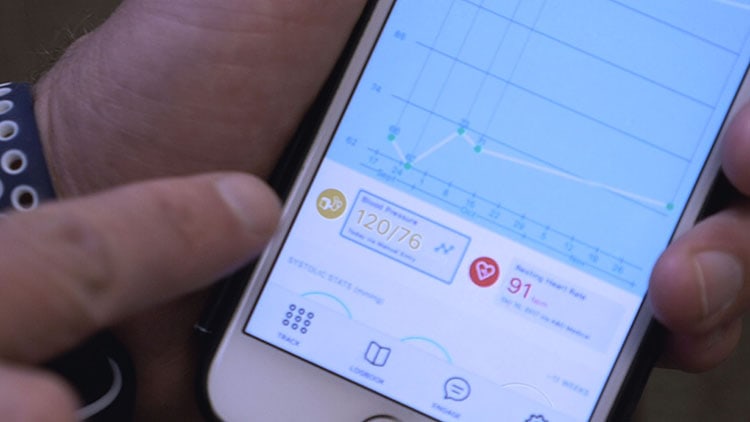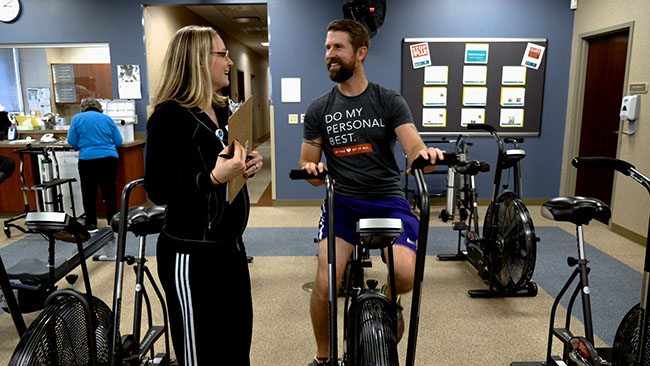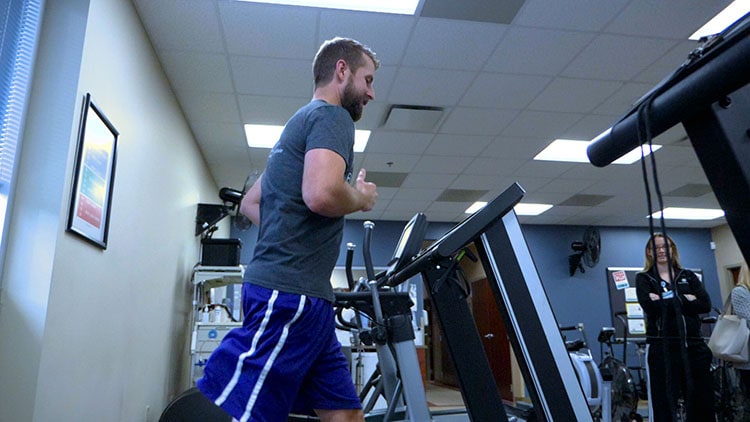On a Thursday morning in June 2017, Stephen Wright’s chest burned. But, with a clean bill of health at 39 years old, the assistant vice president of Invasive Cardiology at Sanger Heart & Vascular Institute wasn’t worried. He ignored the pain, summing it up to indigestion from the spicy meal he’d eaten the night before.
The next day, he went to work again but felt so ill, he had to leave early. Still in pain on Saturday afternoon, Stephen finally went to the Emergency Department at Carolinas Medical Center.
Upon his arrival, care teams jumped into action, quickly discovering Wright was having a heart attack.
“Don’t wait,” says Stephen. “Looking back, I had all the signs and symptoms, but didn’t take the time to listen to my body.”
The Sanger team performed a heart catherization, during which they found a blockage in Stephen’s right coronary artery.
The following Monday, he was discharged from the hospital. But Stephen’s journey to recovery was just beginning. William Downey, MD, medical director for Interventional Cardiology, recommended cardiac rehabilitation, a crucial step toward reducing the risk of advancing heart disease.
At first, Stephen resisted going to rehabilitation, but he eventually decided to give it a try. At Carolinas HealthCare System Pineville, he found comradery with other patients who had similar experiences.
“I talk about the importance of rehab with my role at Sanger, but now I appreciate the ‘Why.’ Having the support of others in rehab truly made a difference in my recovery,” says Stephen. “Completing the program was one of the best decisions I’ve made.”
A multi-disciplinary team, comprised of doctors, exercise physiologists, a registered nurse and a registered dietitian, worked with Stephen in-person and remotely.
The process was not nearly as time-consuming as Stephen expected, thanks to Cardiac Rehab On the Go, a new form of cardiac rehab being piloted by staff at CHS Pineville. Using the MyCarolinas app from a mobile device, patients in the later stages of rehabilitation can check in with hospital staff by remotely logging their progress.

“The new option for cardiac rehabilitation is a game-changer, increasing access for patients who may have trouble accessing reliable transportation to one of the clinics and helping others with busy schedules,” says John Cedarholm, MD, interventional cardiologist with Sanger Heart & Vascular Institute.
For Stephen, teaching others about heart health has taken on a new meaning.
“It could happen to anybody. Do everything you can do to know and reduce your risk factors. You can’t change genetics, but you can exercise, eat right, don’t smoke – there are a lot of things you can do to reduce your risk factor,” he says.
On February 17, Stephen will be running in the Cupid Cup 5k.
Funds raised through the 5K and 1-mile walk will allow CHS Pineville, CHS SouthPark and CHS Union to continue to provide the On the Go pilot program to patients, free of charge. Proceeds will also help to cover many patients’ medical expenses associated with traditional cardiac rehabilitation at CHS.
“The pilot program really gave me peace of mind knowing that I was doing everything that I should be doing and doing it safely,” says Stephen. “It’s a wonderful feeling to know I am helping others get the most advanced cardiac care possible – both every day in my role at Sanger and through my participation in the annual Cupid’s Cup.”


